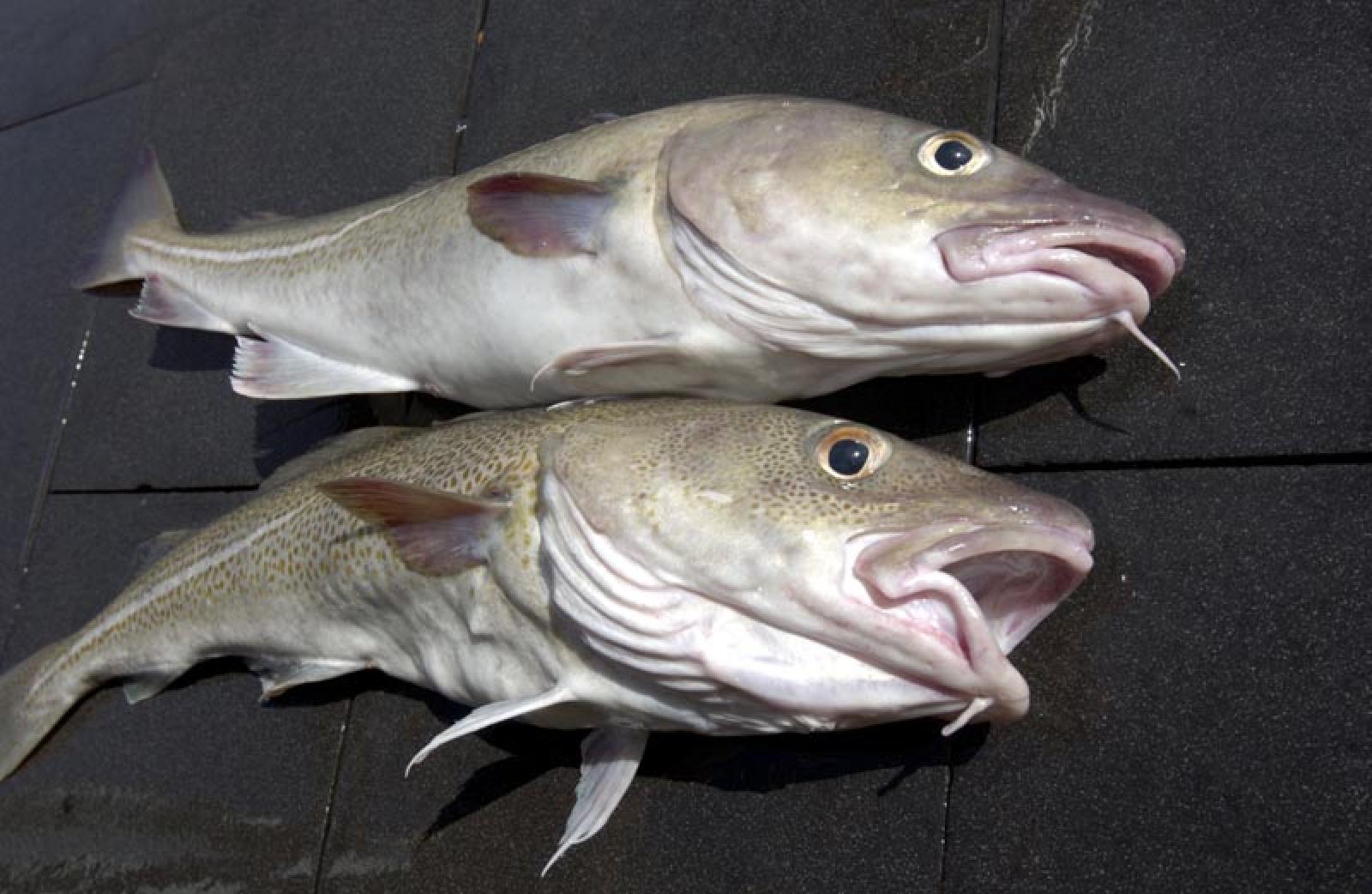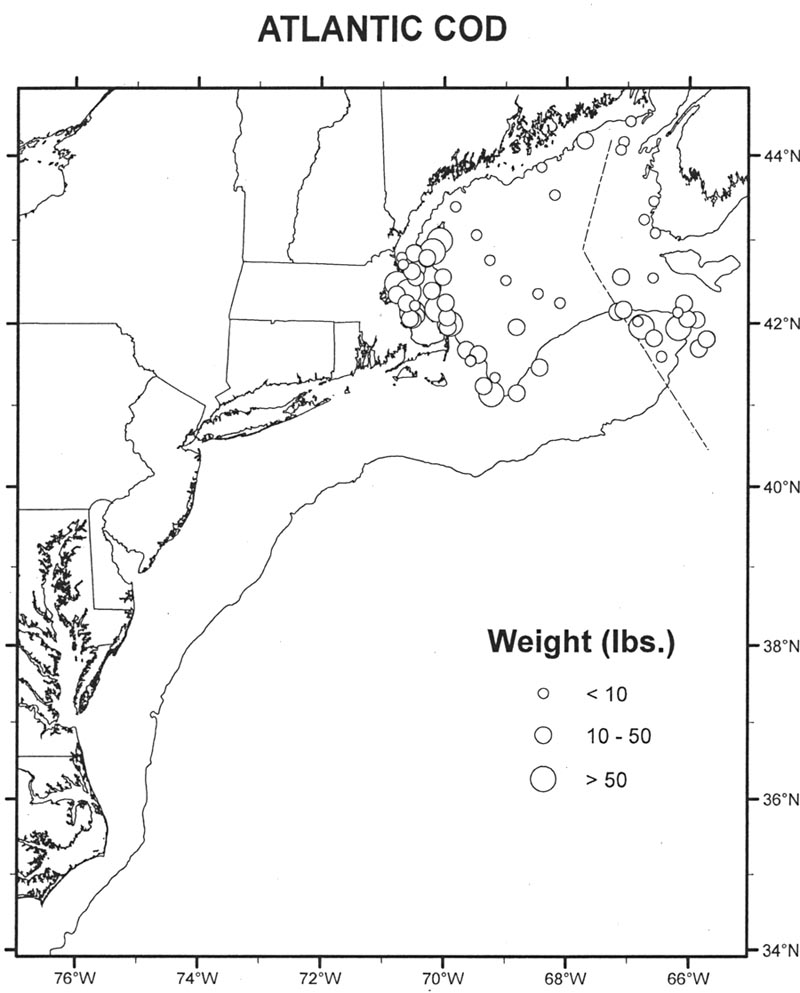Fishermen who pursue a variety of important fish on Georges Bank and the Gulf of Maine face drastic cuts in catch limits next year because of dwindling groundfish stocks. Cod and yellowtail flounder are in such a dire state that fisheries managers advising the New England Fishery Management Council are calling for catch limit cuts of 70 per cent or higher beginning next May.
The assessment has prompted a delegation of Massachusetts legislators to call on the federal government for “a disaster declaration for New England fishermen and fishing communities.”
Popular and highly valued, cod was once one of the most abundant fish in the sea. It is now in such trouble that fisheries managers are advising that to keep the stock from being overfished further, fishing needs to be cut 70 per cent for Georges Bank cod, and 72 per cent for Gulf of Maine cod.
Yellowtail flounder, once a staple, will have to drop 45 per cent. While Georges Bank haddock are okay, the fisheries managers are calling for a reduction of as much as 73 per cent for haddock that is harvested in the Gulf of Maine. The National Marine Fisheries Service (NMFS) document, based on preliminary data, was issued jointly by scientists from both the Gloucester and Woods Hole Fisheries science centers following a July 30 meeting in Wakefield for top fisheries managers within the New England Fishery Council.
Council officials say the cuts are necessary to protect the stock because some fish stocks have been in decline for several consecutive years because of a lack of juveniles being born, while others continue to be overfished despite strict rules aimed at eliminating overfishing.
Commercial fishermen have already dealt with significant fishing reductions over the last 20 years. So it only took a few days for the region’s fishermen to respond and for congressmen to call for help. They are calling for a way to reverse the apparent downtrend in fishing stocks and preserve their livelihood.
“This is the most significant reduction ever,” Jackie Odell, executive director of the Northeast Seafood Coalition, told the Gazette. “At this point in time, everything has to be on the table, the science, the management and the law,” Ms. Odell said. A statement from the coalition, a Gloucester-based organization made up of industry representatives and fishermen, said, “Year after year the industry has complied with everything that science and management have asked for, but ultimately, the status of several core stocks continue to decline.”
Last Friday, top Congressional legislators issued a response calling on the “federal government to declare a disaster declaration for New England fishermen and fishing communities.” In a joint statement, Senators John Kerry and Scott Brown, along with Congressmen Edward Markey, Barney Frank, John Tierney and William Keating stated: “We are extremely concerned about the recent National Marine Fisheries Service report, which included troubling information regarding potential declines in groundfish stocks in both Georges Bank and the Gulf of Maine.” They wrote further: “We also request that the federal government provide emergency disaster assistance to our fishermen and fishing communities to assist them in dealing with any future declines in fishing.”
On Thursday, Samuel Rauch, a NOAA fisheries expert and C.M. (Rip) Cunningham Jr., chairman of the New England Fishery Management Council, issued a joint statement expressing continued commitment to preserving the fishery and the groundfish industry. “Today, we are continuing to engage in a conversation with our regional partners well in advance of the start of the 2013 fishing year. While there is unlikely to be any solution to fully mitigate the challenges in 2012, we plan to continue to work closely with the industry to explore every possible option.”
Pat Fiorelli, a spokesman for the New England Fishery Management Council, said it is unclear why, despite cuts in fishing effort, cod and other groundfish stocks are not recovering.
Efforts in the past have included cutting the number of days that a fisherman can pursue groundfish. There have been limits in the issuance of permits. Much of Georges Bank is closed to fishing during certain times of the year. Though it is a year-round fishery, the best time to fish is in the spring.
Ms. Fiorelli said, “Managers and fishermen have worked very hard to protect these resources, but for reasons that are not clear at this writing, we still have stocks in poor condition.”
Mr. Cunningham told the Vineyard Gazette yesterday: “People need to realize that if you don’t have [something to harvest] out there, then everybody is out of business.
Fortunately, Mr. Cunningham said, there are stocks that have shown signs of recovery due to management. “Georges Bank haddock has had another year that is off the charts, if you believe the numbers and the science. Pollock is in pretty good shape. Georges Bank winter flounder is showing signs of improvement. There are some bright lights.”
Mr. Cunningham blames a confluence of events to bring about groundfish stock decline in the Gulf of Maine. “We are seeing a perfect storm that has happened in the Gulf of Maine. We have much higher level of freshwater runoff going into the gulf. There is lower salinity. There has been ice melt. Labrador is bringing down more freshwater from ice melts. All those have impacts. All have come together to cause a downturn.”
Looking ahead, the fisheries council will hold meetings late in the year to come up with appropriate measures for the reductions.
Ms. Odell said she is concerned about management response to fish assessments. “We have had these wildly fluctuating stock assessments,” she said. “We are looking for a more even keeled management response to fluctuating science. We are looking for more balance in management.”








Comments
Comment policy »